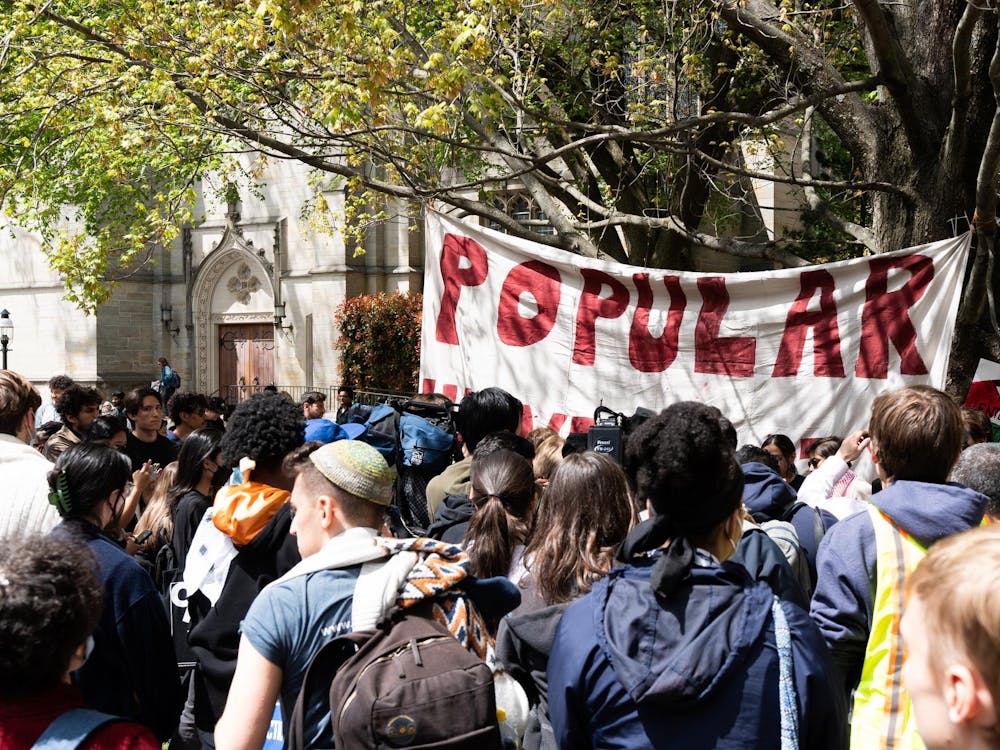Counseling and Psychological Services has made a number of changes to its daily practices regarding mental health withdrawal and readmission, including publishing a “Frequently Asked Questions” document on its website and changing the letters sent to students with instructions on how to reapply following a mental health withdrawal.
The changes, CPS said, are a result of student feedback.
The revisions come amid a year when the University's mental health policies have been heavily criticized.
The University was sued in March by a student who alleges discrimination on the basis of mental health, with the student alleging he was forced to withdraw following a suicide attempt. The lawsuit also alleges the University violated medical confidentiality in forcing a student to withdraw by sharing information from his confidential CPS sessions with administrators.
In the months afterwards, another student wrote an op-ed in The Daily Princetonianabout her similar experience, and several Undergraduate Student Government student-administration conversations revealed student distrust of the University’s practices.
The student who wrote the op-ed also provided the 'Prince' with a readmission form that was sent to her that requested that she reveal detailed confidential medical information gathered during sessions with a private treatment provider during her year off. This information would have to be provided in order to be readmitted to the University, the form said.
In addition to her op-ed, she published a letter in which her college dean listed treatment recommendations to which she would have to adhere in order to be readmitted.
Since then, CPS has published a “Frequently Asked Questions” document on its website, which currently serves as an unofficial document for students considering withdrawal.
Speaking about the FAQs, USG U-Councilor and Mental Health Initiative Board chair Zhan Okuda-Lim ’15said the administration had made striking progress and shown a significant willingness to work with students to promote transparency.
“I have never seen the administration publish something so quickly on an issue so important,” Okuda-Lim said.
The document says that “in almost all cases, it is the student who has decided that taking time off is the best option.” The two main reasons for this are that the student either wishes to pursue more extensive treatment, or the student has been unable to concentrate on coursework.
However, previously confidential letters published by the University in the context of the mental health lawsuit show that the lines between a forced and a voluntary mental health withdrawal are blurry. In one of those letters, Vice President for Campus Life Cynthia Cherrey gave the student who attempted to commit suicide two options: withdraw voluntarily or be forced to withdraw.

A withdrawal in those conditions would be counted as a voluntary withdrawal.
Fewer than five students have been forced to withdraw in the last ten years, the document says. Students are only required to withdraw if “the student’s safety or the safety of others is at extraordinarily high risk, and no reasonable modifications or accommodations while the student is in residence can adequately reduce that risk,” the document says.
Of about 100-200 students who withdraw each year from the University, approximately 35 withdraw for mental health reasons, the FAQs say. Of these, only three to five are “strongly counsel[ed]” to withdraw and the rest do so voluntarily.
The document also describes the exit and readmission evaluations filled out by doctors when students exit or reenter the University for mental health reasons. These evaluations, Chin said, are not about specifically treating the student, but about assessing the seriousness of the situation and forming further treatment recommendations to guide the student and the dean through the withdrawal and readmission processes.
Chin added that administrative evaluations are completed at the request of the deans and releasing comments from the evaluations requires a specific consent form. He explained that they need a specific consent form because everything done at CPS is covered by confidentiality.
“Information will be sent to the deans as a result of the [exit and readmissions] evaluations,” Chin said. “This is one of those exceptions that doesn’t meet the usual criteria [for confidentiality] — a unique service that Counseling Services does for the deans.”
Typically, confidentiality is only broken in the case of severe risk of harm to oneself or others, Chin said.
The FAQs are also in the process of being transformed into a more official and informative document, Chin said.
“We want to anticipate any question that anyone might have about CPS, the different services it offers and what confidentiality means here,” Chin said.
Okuda-Lim said the FAQs may be modified, in response to an Undergraduate Student Government referendumurging the administration to publish its policies for mental health withdrawals and readmissions. The referendum passed in a general election by the undergraduate student body with 95.5 percent support in November.
The administration does not have to adhere fully to the referendum, but Okuda-Lim said discussions regarding its provisions are already in place. The Mental Health Initiative Board recently met with Senior Associate Dean of the College Claire Fowler and has upcoming meetings with several other administrators to discuss how best to comply with the referendum’s requests.
“All of us – students, administrators, other members of the University community – realize that doing nothing is not an option. We have to make progress moving forward,” Okuda-Lim said.
In addition, the letters sent to students with instructions on how to reapply following a mental health withdrawal have been reduced from six pages to one, with a section asking for an outside therapist’s recommendation rather than specific medical information.
[scribd id=249835336 key=key-0NQZhwUhTe40N9ETDwvR mode=scroll]
Chin said the form previously asked for much more specific information and that there were ambiguities about what information would be kept confidential. In an op-ed last year, a female student wrote she was concerned she would have to release her private medical information in order to be readmitted.
“We want to make it clear that students have a right to privacy and a right to the confidentiality of their sessions,” Chin said.
The form now simply asks the student’s outside treatment provider to indicate whether or not the student is safe to return to the University and provides a full page for the provider to give clinical recommendations to enhance the student’s capacity for success upon his or her return to the University.
[scribd id=249835254 key=key-rhfjW3JOC35xEbzHhvpf mode=scroll]
Chin also noted that the letter sent to students who have just left the University has been changed. The letter previously contained instructions from CPS for ongoing treatment and information about the required readmission evaluation, as published in the female student’s op-ed.
The purpose of the readmission evaluation is to give information to deans about the student’s progress and potential future treatments, Chin said, and students are given two special consent forms: one so their private treatment provider can complete the treatment provider form and one so the information from the readmission evaluation can be shared with deans.
“[It’s about] making the process more humane,” Chin said.
The student who wrote the op-ed said she was highly encouraged by this, especially as she applies for readmission this month. In previous interviews, she had said she thought the University had pure motives but was simply misguided when it came to helping students through mental health issues. This, she said, is a step in the right direction.
“The fact that they are trusting the student's primary treatment provider is so huge,” she said. “It really is all about the tone.”
When she opened the letter, she began crying out of relief, she said, as she was previously worried that the University would have demanded to know more of her confidential medical information. She also added that she hopes this means students will reciprocate this trust towards CPS.
“We expect that all students will be readmitted,” the FAQs say. “In our experience, the overwhelming majority of students who take time off and make progress in addressing their issues while away, return and successfully complete their degrees.”
Okuda-Lim credited the filing of the lawsuit, the op-ed in the ‘Prince’ and other students who came forward with the push for action.








